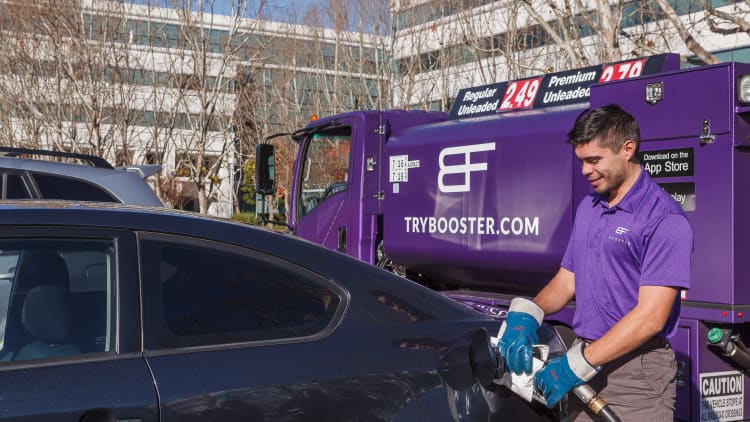
After almost a decade in aerospace, rocket scientist Frank Mycroft wanted to work on tech that would improve life on Earth. He stepped out of what he regarded as a dream job at Planetary Resources, a start-up working on asteroid mining systems, to create Booster Fuels in 2014 with co-founders Diego Netto and Tyler Raugh.
Booster delivers fuel to drivers, wherever they park at work, so they don't have to waste time going back and forth to a gas station.
Corporations offer Booster as a work perk. The Burlingame, California, startup doesn't charge employers to get started. They just need to allow Booster's trucks and service professionals onto their lots, and agree to promote the service like other benefits to employees.
Several big Silicon Valley corporations, including eBay, Facebook, Cisco and Oracle, have already signed up. So far, access is limited. Booster only operates in commuter towns around Dallas-Fort Worth and the San Francisco Bay Area.
Mycroft said inspiration for the start-up struck while he was in his car, waiting to refuel at a station close to home. "It really bothered me how much gas I was burning just to get more gas," he said. At the same time, he wanted to make sure the car's tank was always full so his then-pregnant wife wouldn't have to navigate a gas station alone.
An estimated 8.3% of robberies occur at gas stations and convenience stores each year, according to research from the Center for Problem-Oriented Policing. The gas station closest to their home had suffered a crime wave.
Tragically, Mycroft said, one of Booster's investors lost a parent during a violent crime that took place at a gas station.
Drivers who want to skip gas stations and their associated risks can download the Booster app to book delivery of premium or regular fuel on the same or next day, as long as the app is already authorized where they park. Users leave the fuel door on their vehicle open, but don't need to meet a delivery person in the lot.
Would-be competitors to Booster include venture-backed Yoshi, which charges users a membership fee; Filld which charges a delivery fee; and the commercial fleet-focused Fuel Panda, to name just a few.
However, Booster has designed and patented some of the technology on its fuel delivery trucks, which Mycroft thinks will give it an edge.
Mycroft said, "On the hardware side, we have the ability to load fuel and deliver fuel from the same vehicle without needing any middle men. That's novel and allows us to pass savings on to consumers." Booster procures fuel directly from wholesale providers like Exxon and Shell, then pumps it into a customer's car, all using the same vehicle.
We asked Mycroft if fuel delivery is really necessary. Like so many on-demand services, it seems like a nice convenience for the wealthy. The CEO countered, "Why did we need Netflix when we had DVDs?"
To-date, at least 100,000 people have used the app for one delivery and tens of thousands use it every month.
A consumer technologies investor, Maveron General Partner David Wu, told CNBC that Booster's technology is the key to making fuel delivery into a profitable, hyper-growth business. "Bypassing the gas station is one thing. You need to get density into the economics of having your employees out there pumping gas. Otherwise, you end up with another on-demand servcice that can't survive, even if it is loved by consumers."
Booster just raised $20 million in a series B round of venture funding to expand, Mycroft and Wu told CNBC. Booster has its eye on suburban areas across the country, especially near New York City, and hopes to be operating there within a year or two.
Conversion Capital led Booster's latest round, joined by its earlier backers Maveron and seven others. The funding brings Booster's total capital raised to $32 million.


